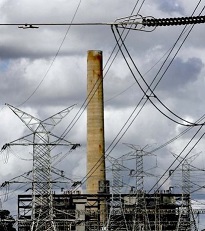Big fund gets $600m cold feet over green power
 Global fund managers have responded to the warnings from the renewable energy target (RET) review, seeing a write-down of Pacific Hydro for a few hundred million dollars.
Global fund managers have responded to the warnings from the renewable energy target (RET) review, seeing a write-down of Pacific Hydro for a few hundred million dollars.
IFM Investors has $50 billion worth of assets under its management, but the big fund has taken a $685 million write-down on Pacific Hydro renewable energy assets due to the dark outlook of the Abbott government's Warburton review and a drop in electricity demand in Australia.
IFM Investors chief executive Brett Himbury has told Fairfax Media that valuation changes to Pacific Hydro (which has hydro, wind, solar and geothermal projects in Australia, Brazil and Chile) were driven by the RET review under businessman Dick Warburton, which claimed that the Australian Government is spending too much to encourage renewable investment.
Himbury said the review undermined confidence.
“There's two primary factors [impacting the Australian assets]: a lowering of energy demand and uncertainty around the current laws,” he told the Sydney Morning Herald.
“It's a great shame that at a time when the likes of President Obama are saying there's no bigger challenge for the globe than climate change, we've got this policy uncertainty.”
The uncertainty and outright dislike in renewable systems from the Federal Government is not the only factor, as is reflected in big cuts to the Australian Energy Market Operator’s annual forecasts for electricity demand over the next decade.
“We'd like to see continued commitment to the current bipartisan agreed target and more broadly as investors we'd prefer to see a relatively certain [regulatory] environment,” Mr Himbury said.
“As long-term investors you'd like to think that there is economic value in renewable energy, but what we need is clarity and certainty.”
The renewable energy industry has warned that $15 billion in renewable energy investment could be easily lost, if the RET is reduced too far.
Because of the Pacific Hydro write-downs, IFM's huge Australian Infrastructure Fund is looking at a drop in value of about 5 per cent for the September quarter – a big hit for a government that is relying on infrastructure investments to become stable, defensive assets for the long term.







 Print
Print